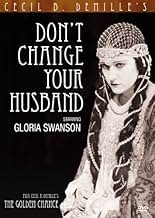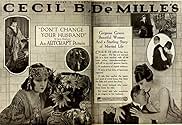Füge eine Handlung in deiner Sprache hinzuLeila Porter comes to dislike her husband James, a glue king who is always eating onions and looking sloppy. But after she divorces him and marries two-timing playboy Schuyler Van Sutphen th... Alles lesenLeila Porter comes to dislike her husband James, a glue king who is always eating onions and looking sloppy. But after she divorces him and marries two-timing playboy Schuyler Van Sutphen the now-reformed James looks pretty good.Leila Porter comes to dislike her husband James, a glue king who is always eating onions and looking sloppy. But after she divorces him and marries two-timing playboy Schuyler Van Sutphen the now-reformed James looks pretty good.
- Undetermined Role
- (Nicht genannt)
- Manager of Gambling Club
- (Nicht genannt)
- Croupier at Gambling Club
- (Nicht genannt)
- Member of Gambling Club
- (Nicht genannt)
- Mr. Frankel - Dressmaker
- (Nicht genannt)
- Undetrmined Role
- (Nicht genannt)
Empfohlene Bewertungen
Here she plays Leila Porter, the wife of successful but disinterested banker and onion-eater James Denby Porter (Elliott Dexter). Feeling neglected by her husband, Leila leaves him for the charming Schuyler Van Sutphen (Lew Cody), only to discover that her former husband's onion breath is far less of a problem than having an unfaithful and incompetent roustabout for a husband. James undergoes a transformation, including giving up his beloved onions, and is determined to win Leila back. It all makes for a fun and occasionally astute exploration of marital woes. Its strength is that it maintains its light touch rather than endeavoring towards heavy-handedness, and at 80 minutes it breezes by.
This little romantic comedy clips along from scene to scene with a few exotic twists (some imaginary scenes and a costume party). All of this is centered around the wife of the husband(s) who is looking to break out of the doldrums, played by Gloria Swanson (she is twenty here!). Both the leading men have a natural air that is convincing and of course Swanson is perfect in all kinds of moods, from frivolous to worried to hopeful.
Behind all the games and apparent lightheartedness is that old serious problem of staying in love and not straying in love. There's a little corniness, but director DeMille is on top of keeping it snappy and believable in all. As with many films from this period, the subtitles do not just tell what they are saying (or thinking) but often give a kind of philosophical insight, as if to justify the tragedy (or raciness). And there is that higher purpose here, probably better without the instructional text, but it's part of the narrative style, and it's kind of quaint.
If you are looking for visual or formal amazement, you won't find it here. But as a story, well acted, and filmed with precision and economy, it's really a great example. The events might not come as a total surprise, but it's such a modern love story, set almost a hundred years ago, it's a gas. And did I saw Swanson was perfect?
I also thought it was similar to todays life, even though it was produced in 1919, you could relate it to todays time, most women want the good looking man and in the end it doesn't turn out to be what you expected and you want what you did have at one point.
Although the old DeMille formula was beginning to change, and his films were becoming wordier and less purely visual, with such an expressive performer as Swanson we regain much of that silent storytelling style. Her character does very little, but conveys volumes through subtle gesture and facial expression – with a particular talent for looks of disdain. In real life Swanson was herself coming towards the end of her disastrous marriage to Wallace Beery, and it's possible that this fact fuelled her convincing performance.
As if to best complement his leading lady's talents, DeMille's use of framing and close-ups is particularly strong here. He uses cinematic technique to show off the acting – often holding Swanson in lengthy close-ups at key moments – and also to clarify the story visually. For example, when we are introduced to the character of Toodles, she is shown reflected three times in a dressing table mirror. Her character disappears from the story, only to become important towards the end. That attention-grabbing first shot of her helps us remember who she was. Later, at the anniversary dinner, Swanson and future husband number two Lew Cody are framed together in one shot, while Elliot Dexter is isolated in his own frame. Also – and this is a sign of the increasing sophistication of cinema in general – there is much use of reaction shots – for example the disapproving glance of the bishop when Cody acts out his intentions with the wedding figure dolls.
In contrast to DeMille's visual narrative method was the increasingly verbose screen writing of his collaborator Jeanie Macpherson. As I've remarked in several other comments, Macpherson could put together a strong and dramatic story, but like DeMille she tended to state her themes in a somewhat pretentious and flamboyant style. And so we get these very long quasi-philosophical title cards about the pitfalls of married life which, if they improve the story at all, it is only because they are unintentionally funny. For example, only Jeanie Macpherson could come up with a line like "Fate sometimes lurks in Christmas shopping". Fortunately though in this picture these titles mostly introduce scenes rather than break them up.
Although the pictures he made around this time tended to be small scale, it is at this point that DeMille seemed to develop his taste for the spectacular. You can see him start to sneak in excuses for a bit of razzmatazz like the little fantasy scenes of Swanson being showered with "Pleasure, wealth and love". It wouldn't be until the early twenties after the unofficial embargo on historical pictures was lifted that he would get the chance to go all out with the grand spectacle.
All in all, Don't Change Your Husband is a fairly decent DeMille silent picture, although to be honest it is only really the presence Gloria Swanson that lifts it above the average. It's curious though that this is supposedly a comedy, and Swanson was cast at least in part because of her background at Mack Sennett's slapstick factory. She hated comedy acting, and here gives a dramatic rather than a comic performance. It makes sense then that the only straight drama she did with DeMille, Male and Female, was by far the strongest of their collaborations.
Wusstest du schon
- WissenswertesThis is the first collaboration between Gloria Swanson and Cecil B. DeMille.
- Zitate
First Title Card: This does not deal with the tread of victorious Armies, nor defeated Huns - but is just a little sidelight on the inner life of Mr. and Mrs. Porter - who found that they should not have looked for their marital troubles with a Telescope - but with a Microscope.
- VerbindungenFeatured in Boulevard! A Hollywood Story (2021)
Top-Auswahl
Details
- Laufzeit
- 1 Std. 11 Min.(71 min)
- Farbe
- Sound-Mix
- Seitenverhältnis
- 1.33 : 1






















